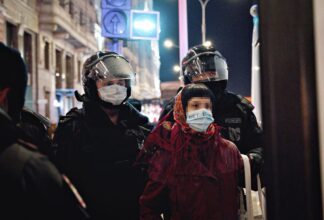Duma Prohibits “Propaganda” of Non-Traditional Relations
On Tuesday 11 June, the Russian Duma passed legal amendments prohibiting “propaganda” of non-traditional sexual relationships among minors. The changes are part of a larger campaign to restrict human rights in Russia, especially rights of LGBT-people, says Civil Rights Defenders and call upon president Putin to refrain from signing the law.
25 LGBT-activists, protesting against the law with a “kissing action”, were arrested, and recently several organisations have been taken to court for not registering as “foreign agents”.
The law on prohibiting propaganda of non-traditional relationships was passed in the second and third readings on the same day by the State Duma, the Russian Parliament. Before it enters into force, the law needs to be signed by the Russian president Vladimir Putin. The law is allegedly aimed at protecting children from harmful information.
“This law is violating the freedom of speech of the Russian people. It is clearly aimed at those advocating for the rights of lesbian, gay, bisexual and transgender (LGBT) persons, and can also be used to silence others. We call upon president Putin to refrain from signing this law,” said Joanna Kurosz, Eurasia Programme Director, Civil Rights Defenders.
The adopted amendments to the bill impose fines for civilians, state officials and legal entities “propagating non-traditional sexual relations” among minors, and other measures against those spreading “propaganda” among minors.
The wording of the bill adopted in the first reading on 25 January was changed from ”propaganda of homosexuality” to “propaganda of non-traditional sexual relations”, a term that has not been used in any federal law previously. The loosely worded bill applied such definitions to homosexuality as “non-traditional sexual attitudes” and “distorted image of equality of traditional sexual relationships”.
Violating the law can also result in administrative suspension of activity of legal entities for 90 days. The stricter punishment will be applied in case of carrying out “such propaganda” in media or on the Internet. The bill also implies measures of punishment for foreign citizens in case of “spreading propaganda” stipulating fines equating to the ones applied with regard to Russian citizens, as well as foreigners’ expulsion from the Russian Federation or their 15 days apprehension with subsequent expulsion.
Tuesday’s amendments are part of a large-scale campaign aimed at cracking down on civil society and restricting human rights and self-expression in Russia, launched by state authorities after Vladimir Putin became president for the third time in May 2012. The propaganda-law also reflects a wider trend of anti-LGBT legislative initiatives that spread across Central and Eastern Europe. “Anti-homosexual propaganda laws” were previously adopted at local level in ten regions across Russia and became subject to legislative discussions in countries such as Hungary, Latvia, Lithuania, Moldova and Ukraine.


